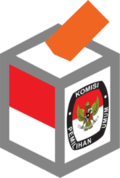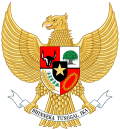| Komisi Pemilihan Umum | |
 Emblem of KPU | |
 Symbol for elections held by KPU | |
| Agency overview | |
|---|---|
| Formed | February 1, 1999 |
| Preceding agency | |
| Jurisdiction | Indonesia |
| Headquarters | Jalan Imam Bonjol No. 29, Jakarta 10310 |
| Agency executives |
|
| Key document |
|
| Website | kpu |
| This article is part of a series on the |
| Politics of Indonesia |
|---|
 |
The General Elections Commission (Indonesian : Komisi Pemilihan Umum, abbreviated as KPU) is the body that organises elections in Indonesia. Its responsibilities include deciding which parties can contest elections, organising the voting and announcing the results and seats won in the various branches of the government.